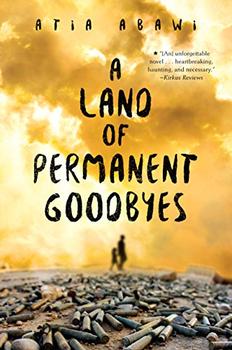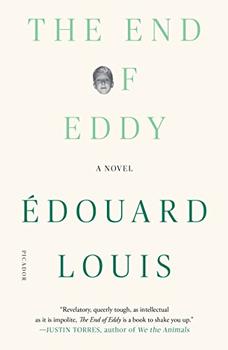Summary | Excerpt | Reviews | Beyond the book | Read-Alikes | Genres & Themes | Author Bio

Junior is not only a smart, nerdy misfit painfully wending his
way through adolescence. He's also dirt poor. He's the son of two alcoholics.
He's the only Indian at his all-white school. And he's physically challenged; he
was born with water on the brain and though he has overcome major mental and
motor deficiencies, his health is so fragile that one blow to the head could
kill him. It would all bit a bit over-the-top for a young adult novel…except
it's largely true. Sherman Alexie's bio on his
website
sounds like a summary of The Absolutely True Diary of a Part-Time Indian.
The book is quirky and funny and captivating in its improbability because it
comes straight from the author's own life.
What makes Junior so appealing is that he is entirely uncowed by his own
nerdiness. Unlike other literary misfits who retreat into their own difference,
Junior is so completely beset by obstacles that he has nothing left to lose, and
so the book becomes a chronicle of his special brand of crazy bravery. First he
leaves the rez. His Indian best friend Rowdy punches him in the face and stops
talking to him when he learns that Junior will be transferring to the all-white
school. Junior continues to call and email him, despite Rowdy's rejection. Then
he tries out for the basketball team at his new school and his crazed intensity
earns him a spot on the varsity team. When Rowdy and Junior go head-to-head in a
game and Rowdy tries to hurt Junior again, Junior forgives him. Alexie's triumph
is that he has created a character who can say things like, "He would always be
my best friend, no matter how much he hated me," and he sounds noble rather than
pathetic. Alexie's narrative comes to life with Junior's wise-beyond-their-years
cartoons, hilariously drawn by Ellen Forney.
But allow me to point out something which has gone unmentioned in the tidal wave
of praise that has swept the novel right up to the National Book Award. The
narrator is clearly not a fourteen-year-old. Alexie has not quite succeeded in
channeling his accumulated wisdom through the narrow funnel of an adolescent.
Junior is all too obviously an adult's version of what a fourteen-year-old would
say and think, and any teenager I know would be able to see right through the
ventriloquism. It takes more than tacking "So, okay," onto the beginning of
every sentence to make them sound authentically young. And despite the title,
the book is written in the past tense. At times the narrative doesn't even
bother to disguise its retrospective look back at youth, as when Junior writes
of his new white best friend, "He would always be the smartest person I'd ever
known. And he certainly helped me through school. He not only tutored me and
challenged me, but he made me realize that hard work—that the act of finishing,
of completing, of accomplishing a task—is joyous." This is Alexie the grown-up,
not Junior the high school freshman.
I'll let this slide, though, because what Alexie does accomplish in the
voice of Junior is desperately valuable to teenage and adult readers alike. When
Junior sees racism and oppression, he calls it like it is—no polite mincing of
words, no tact, no self-pity, just the kind of honesty that makes you gulp. If
you've ever wondered what the difference is between white people and Indians,
Junior can tell you in one sentence: he's only fourteen years old and he's been
to forty-two funerals. He writes wryly, "All my white friends can count their
deaths on one hand. I can count my fingers, toes, arms, legs, eyes, ears, nose,
penis, butt cheeks, and nipples and still not get close to my deaths." He
estimates that roughly ninety percent of those deaths have been due to alcohol.
He may not know the first thing about approaching a white girl (he asks his
friend for advice, and his friend Googles "in love with a white girl"), but he
does possess the wily survival knowledge of the persecuted, downtrodden, and
oppressed. Unable to keep up with the rich white kids at his school, he
brandishes the one commodity he does have—he hides his poverty behind his
Indianness. He turns away junk food he can't afford by claiming that Native
Americans are allergic to sugar. His best all-purpose excuse for getting out of
expensive social events: "There's this Indian ceremony at home…." Junior has a
scholar's understanding of identity politics earned from walking the twenty-two
miles from the rez to his school and then pacing the halls among kids who will
never understand him.
The kids at school despise his weirdness. The kids on the rez revile him for
being an apple—red on the outside and white on the inside. But miraculously,
wonderfully, improbably, Junior possesses an internal strength untrammeled by
the insults of others and piercing in its illumination of sociological
faultlines.
![]() This review was originally published in The BookBrowse Review in January 2008, and has been updated for the
March 2009 edition.
Click here to go to this issue.
This review was originally published in The BookBrowse Review in January 2008, and has been updated for the
March 2009 edition.
Click here to go to this issue.

If you liked The Absolutely True Diary of a Part-Time Indian, try these:

by Atia Abawi
Published 2019
Narrated by Destiny, this heartbreaking - and timely - story of refugees escaping from war-torn Syria is masterfully told by a foreign news correspondent who experienced the crisis firsthand.

by Edouard Louis
Published 2018
An autobiographical novel about growing up gay in a working-class town in Picardy.
Your guide toexceptional books
BookBrowse seeks out and recommends the best in contemporary fiction and nonfiction—books that not only engage and entertain but also deepen our understanding of ourselves and the world around us.